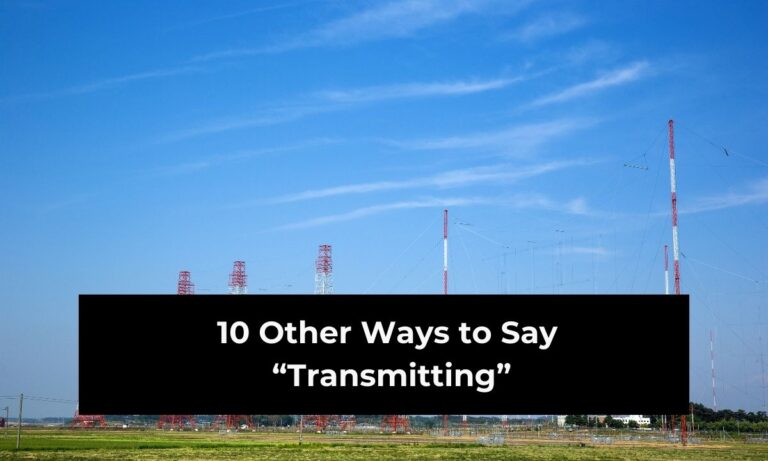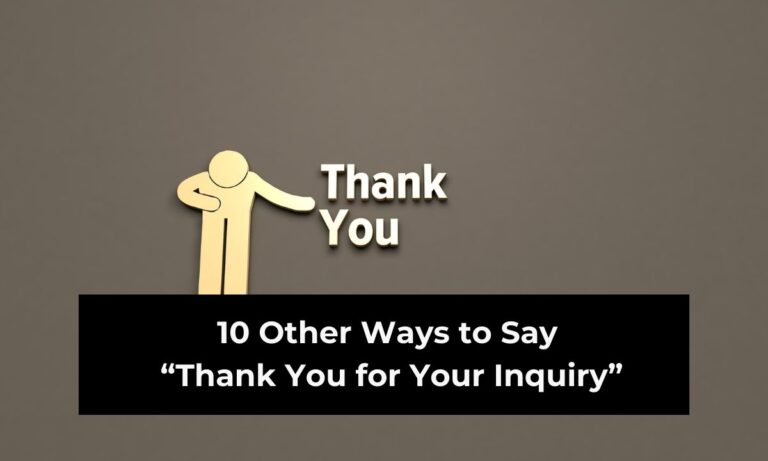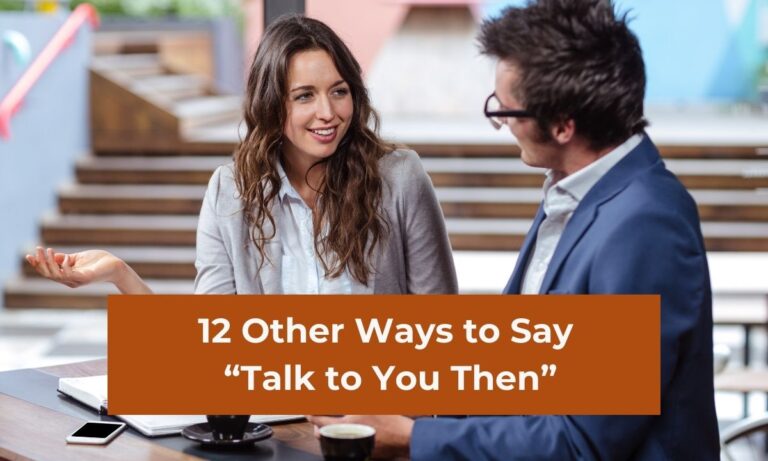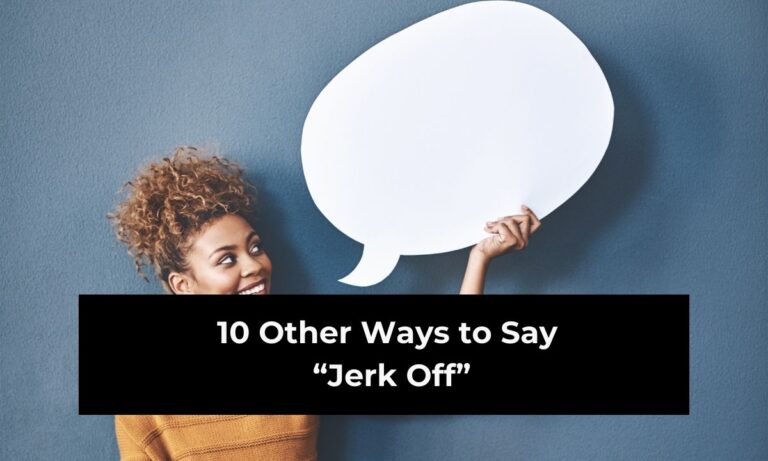When someone shares good news with you, your natural instinct is to respond with positivity. One of the most common replies is, “Happy to hear that.” It’s warm, kind, and encouraging—but let’s be honest, if you use it every single time, it can start to feel repetitive.
If you want to make your responses more genuine, personal, and memorable, it helps to have a variety of phrases at your disposal. Think about it—when a friend tells you they’ve landed their dream job or when a coworker shares that a big project went well, your response can either be forgettable or it can strengthen the connection. The words you choose matter.
Using alternatives to “Happy to hear that” not only freshens up your conversations, but it also allows you to show deeper enthusiasm, empathy, and interest. Whether you’re chatting in person, texting a friend, or responding in a professional email, having more creative expressions helps you sound thoughtful and sincere.
In this article, you’ll discover 10 other ways to say “Happy to hear that”. Each alternative comes with an explanation, examples, and tips on when to use it. These options will help you feel more confident in your responses, while also making the other person feel appreciated and valued.
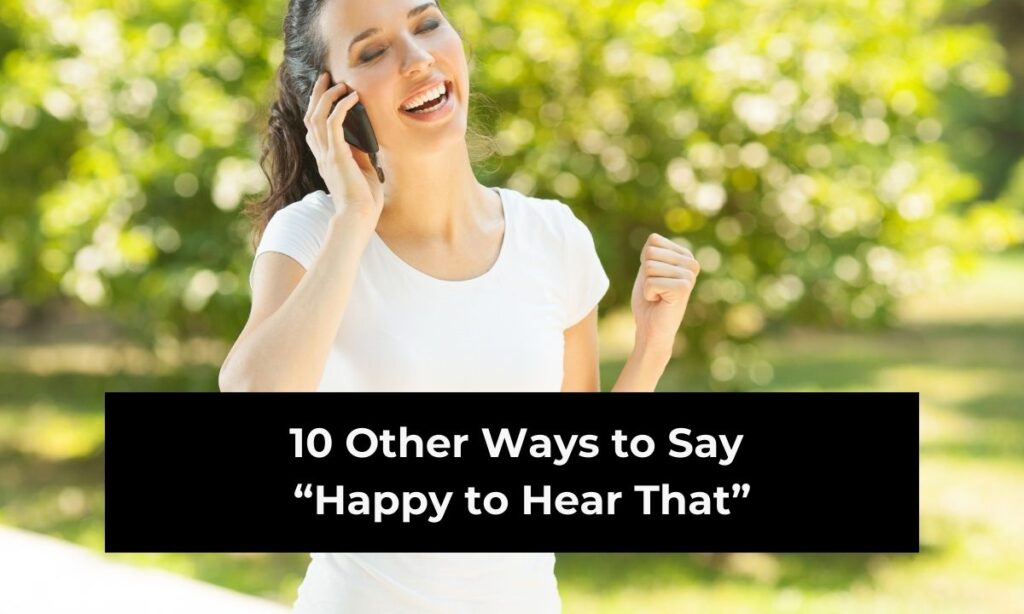
So, let’s explore how you can move beyond the standard reply and bring more energy, warmth, and personality into your conversations.
1. “That’s Wonderful News!”
Sometimes, the simplest way to show joy is to call the news exactly what it is—wonderful. This phrase works beautifully when someone shares a personal win, whether big or small.
You might use this when a friend says they’re engaged, when a coworker announces a promotion, or even when a neighbor tells you their child got into a good school. It feels celebratory and shows you’re genuinely excited for them.
This phrase has a cheerful tone that instantly lifts the mood of the conversation. Unlike “Happy to hear that,” it puts more focus on the positive outcome itself rather than your own feelings. That little shift makes your response feel more outwardly supportive.
If you want to add warmth, pair it with a follow-up. For example:
- “That’s wonderful news! How are you going to celebrate?”
- “That’s wonderful news! You must feel so proud.”
The great thing about this alternative is its versatility. It works in both personal and professional settings, making it a safe yet heartfelt choice when you want to express genuine happiness.
2. “I’m So Glad Things Worked Out”
Life is full of ups and downs, and when things finally fall into place for someone, this response hits just the right note. It not only acknowledges their success but also hints at the journey it may have taken to get there.
For example, if a friend has been struggling to find an apartment and finally signs the lease, saying, “I’m so glad things worked out,” shows empathy. It communicates that you remember their challenges and are happy about the outcome.
This phrase works especially well when someone has been worried or uncertain about how something would turn out. Instead of sounding like a quick, automatic response, it feels like you’re truly invested in their story.
You can also personalize it with more detail:
- “I’m so glad things worked out—you’ve been so patient through this.”
- “I’m so glad things worked out, I knew it would eventually.”
This alternative makes your message more human and thoughtful, reminding the other person that you’ve been paying attention to their journey.
3. “That Makes Me So Happy”
This one is a direct, emotional response that instantly feels personal. By shifting the focus from the news itself to how it impacts you emotionally, you strengthen your bond with the other person.
Imagine a friend telling you they’re feeling healthier after weeks of rest, or a family member sharing that they’ve finally achieved a goal. Saying, “That makes me so happy” highlights your genuine emotional reaction and shows how much you care.
It works beautifully in close relationships where personal feelings are valued. In professional settings, however, you may want to choose a more neutral phrase. But in casual or personal conversations, this is one of the warmest and most genuine responses you can give.
To expand the conversation, you can add:
- “That makes me so happy—I’ve been hoping for this for you.”
- “That makes me so happy. You really deserve it.”
This alternative reminds the other person that their joy contributes to your joy too. It’s a simple way to reinforce connection and celebrate together.
4. “That’s Fantastic!”
Sometimes, you need a short, energetic burst of positivity. “That’s fantastic!” is exactly that—it’s upbeat, enthusiastic, and instantly conveys excitement.
If a coworker shares that their project was a success, or a friend tells you they got concert tickets they’ve been wanting, this response is a perfect fit. It shows that you’re not just acknowledging the good news, but celebrating it with them.
This phrase is especially effective in casual conversations, but it can also work in professional environments where you want to be encouraging without sounding too emotional.
Want to take it up a notch? Add a follow-up question:
- “That’s fantastic! When do you start the new role?”
- “That’s fantastic! You must be thrilled.”
By pairing it with curiosity, you keep the conversation flowing and show genuine interest.
5. “I Love Hearing That”
This alternative has a warm and friendly tone that feels personal without being overly formal. It’s perfect when someone shares something uplifting, and you want to express not just happiness, but enjoyment in hearing their news.
For example, if a friend says they’re finally getting more free time to relax, or a colleague mentions that a team project turned out smoothly, “I love hearing that” makes your response more heartfelt.
This phrase is also great for ongoing conversations. Imagine someone sharing progress updates with you—it keeps the exchange light and encouraging, making them feel like you genuinely enjoy hearing from them.
To make it stronger, add a little context:
- “I love hearing that. You’ve worked so hard.”
- “I love hearing that. It brightens my day.”
It’s a subtle yet meaningful way to show gratitude for their good news while reinforcing positivity in your conversations.
6. “That’s Such Great News”
When you want something simple, clear, and professional-friendly, this phrase is a reliable choice. It’s slightly more formal than “That’s fantastic” but still carries enthusiasm.
It works well in emails, workplace chats, or any context where you want to remain polite but still show excitement. For instance, if a client tells you that their project launch was successful, replying with “That’s such great news” communicates positivity without being over the top.
In personal situations, it also shines. Imagine a family member telling you their health test results came back positive—this phrase acknowledges the weight of the moment with respectful joy.
You can enrich it with a supportive note:
- “That’s such great news. I’m so relieved to hear it.”
- “That’s such great news. Congratulations!”
It’s a versatile choice that balances warmth with professionalism, making it suitable for nearly any situation.
7. “I’m Thrilled to Hear That”
“Thrilled” adds a burst of excitement and makes your reaction feel more powerful than just “happy.” It’s perfect when you want to emphasize how much the other person’s news truly means to you.
For instance, if a close friend tells you they got engaged or a colleague announces that their big proposal was approved, responding with “I’m thrilled to hear that” carries genuine energy.
This phrase works especially well when the news is something big or life-changing. It elevates your response beyond casual happiness and shows that you’re celebrating right along with them.
Try pairing it with encouragement:
- “I’m thrilled to hear that—you’ve been waiting for this moment!”
- “I’m thrilled to hear that. You deserve every bit of success.”
It’s a great way to emphasize enthusiasm without going over the top, striking just the right balance of excitement and sincerity.
8. “That Really Brightened My Day”
This is a thoughtful way to let someone know their good news has a direct impact on your mood. It turns your response into a compliment—it tells them that not only are you happy for them, but hearing their success actually lifted your spirits.
This phrase works beautifully in close relationships where you want to deepen connection. For example, if a friend tells you they finally passed an exam they’d been stressing over, saying, “That really brightened my day” shows just how much their success matters to you.
It’s also a great way to encourage people to keep sharing good news with you. After all, who doesn’t like hearing that their words made someone else’s day better?
You might extend it by saying:
- “That really brightened my day. Thank you for sharing.”
- “That really brightened my day—I’m so proud of you.”
It’s a gentle, caring, and uplifting response that leaves a lasting impression.
9. “That’s Music to My Ears”
This playful and expressive phrase adds creativity to your response. It’s a fun way to show joy and relief, making it ideal for informal conversations.
You might use it when a friend says they’re finally free for the weekend, or when a coworker announces that a challenging task has been resolved. It conveys that the news is exactly what you wanted to hear.
Unlike the more straightforward responses, this one carries a metaphorical charm. It shows personality and adds a little flair to your communication.
To expand it, you could say:
- “That’s music to my ears. I’m so glad things turned around.”
- “That’s music to my ears—it’s about time!”
This alternative keeps your conversations lively, memorable, and less predictable.
10. “I’m So Pleased to Hear That”
This is a refined and polished way to express happiness. It’s slightly more formal than “That makes me so happy,” making it an excellent choice for professional or respectful conversations.
For example, if a colleague tells you a client responded positively, or if a neighbor shares that their health is improving, “I’m so pleased to hear that” strikes just the right balance of warmth and professionalism.
It’s polite, thoughtful, and versatile. You can also personalize it with encouragement:
- “I’m so pleased to hear that. I knew you’d handle it well.”
- “I’m so pleased to hear that. What a relief!”
This phrase is especially useful when you want to sound supportive while keeping your response measured and professional.
Conclusion
Words matter, especially when you’re celebrating someone else’s joy. Saying “Happy to hear that” is always kind, but expanding your vocabulary with alternatives makes your responses feel more genuine and memorable. From casual phrases like “That’s fantastic!” to more polished ones like “I’m so pleased to hear that,” you now have a wide range of options for different situations.
Whether you’re responding to a friend, colleague, or loved one, the right words can deepen connections and show that you’re truly invested in their happiness. Each of these alternatives allows you to tailor your response to the context—whether you want to sound professional, playful, or deeply heartfelt.
The next time someone shares good news with you, try one of these fresh phrases. Not only will you avoid sounding repetitive, but you’ll also make the other person feel genuinely celebrated. After all, joy is contagious, and sharing it in the right words can brighten both your day and theirs.
FAQs
1. Why should I use alternatives to “Happy to hear that”?
Using different phrases makes your responses feel fresh, genuine, and personal. It prevents your replies from sounding repetitive and helps you connect more deeply.
2. Are these alternatives suitable for professional conversations?
Yes. Phrases like “That’s such great news” and “I’m so pleased to hear that” are polished enough for workplace settings, while others like “That’s fantastic” work in casual emails too.
3. Which phrases are best for close friends and family?
Warm and emotional options like “That makes me so happy” or “That really brightened my day” work beautifully in personal conversations.
4. Can I use these alternatives in text messages?
Absolutely. Most of these phrases are short and conversational, making them perfect for texting, messaging apps, or quick replies.
5. How do I make my response even more meaningful?
Add a follow-up question or compliment. For example, instead of just saying, “That’s wonderful news,” you could say, “That’s wonderful news! How are you going to celebrate?”
